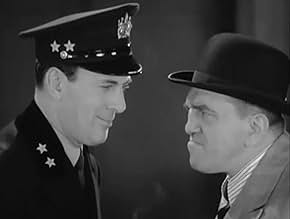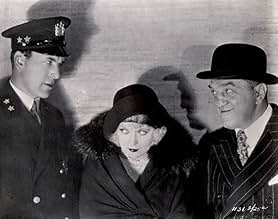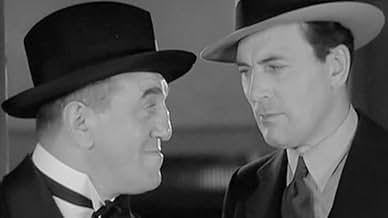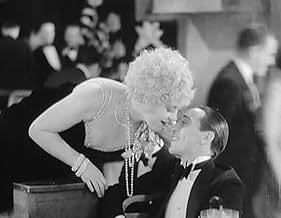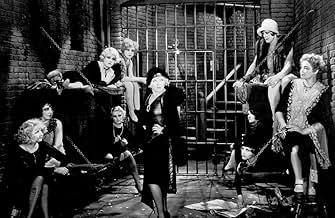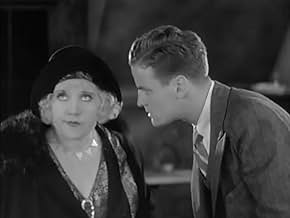CALIFICACIÓN DE IMDb
6.6/10
1.8 k
TU CALIFICACIÓN
Agrega una trama en tu idiomaAn honest police captain vows to bring down a powerful bootlegger who is protected by corrupt politicians and judges.An honest police captain vows to bring down a powerful bootlegger who is protected by corrupt politicians and judges.An honest police captain vows to bring down a powerful bootlegger who is protected by corrupt politicians and judges.
- Dirección
- Guionistas
- Elenco
- Nominado a 1 premio Óscar
- 3 premios ganados y 1 nominación en total
G. Pat Collins
- Patrolman Johnson
- (as Pat Collins)
George E. Stone
- Joe Scarsi
- (as George Stone)
Sam De Grasse
- District Attorney Welch
- (as Sam DeGrasse)
Richard 'Skeets' Gallagher
- Miller
- (as Skeets Gallagher)
Frank Austin
- Man at Funeral
- (sin créditos)
Walter Brennan
- Man on Street in Front of Barber Shop
- (sin créditos)
Jimmy Dime
- Rival Gang Lookout
- (sin créditos)
Jim Farley
- Detective
- (sin créditos)
Ruth Feldman
- Woman on stairs
- (sin créditos)
Sherry Hall
- Orchestra Leader
- (sin créditos)
Opiniones destacadas
I watched this in anticipation of Josef von Sternberg's UNDERWORLD (1927), a film that revolutionized the gangster genre – which THE RACKET is as well (I am already familiar with its 1951 remake from the same producer, Howard Hughes). Playwright Bartlett Cormack helped adapt his own work to the screen; interestingly, the chief hoodlum during the original theatrical run was essayed by Edward G. Robinson – who would achieve movie stardom with a similar role in LITTLE CAESAR (1930)!
Though the original was nominated for the Best Picture Oscar, ultimately, I still think that the later version is superior (even if nominal director John Cromwell ended up getting replaced by Nicholas Ray!) – principally because there the antagonistic relationship at its core was formidably filled by Roberts Mitchum and Ryan! In this version, we have forgotten star Thomas Meighan as the quintessential (albeit over-age) Irish cop and burly but suitably smarmy Louis Wolheim (who would re-unite with director Milestone for his Oscar-winning masterpiece ALL QUIET ON THE WESTERN FRONT [1930]). From what I can recall, the plot is pretty much identical between the two versions (for the record, I own Warner's SE DVD of the 1951 movie, while the earlier one was restored for DVD release by Silent-movie specialists Flicker Alley but it somehow never hit stores!): the gangster not only muscles in on a rival (the entire mob's come-uppance in a speak-easy, during a party thrown in honor of Wolheim's younger brother no less, is superbly realized by Milestone) but even seems to have authority figures under his thumb (recalling in this way the recently-viewed THE GLASS KEY [1935], down to a car-accident-turned-murder-rap which sends a ripple through the already murky waters) – so that, no matter what he or his associates do, they are sure to get away scott-free!
In both, there is also a girl – pretty but spirited Marie Prevost in 1928, sultry-yet-dull Lizabeth Scott in 1951 – who first gets embroiled in the villain's schemes and, then, becomes a pawn in the protagonists' struggle for supremacy (which sees Meighan transferred to a precinct far removed from the center of activities and Wolheim tripping himself up by personally exacting revenge upon the cop who arrested his sibling). On the side-lines are a trio of reporters, two vaguely comical (though their antics only seem to exacerbate the feud between policeman and criminal!) and the other a rookie (who becomes involved with Prevost, and is actually the one to bring the villain to book) – his eventual demise, then, emerges to be heavily tinged with irony!
Though the original was nominated for the Best Picture Oscar, ultimately, I still think that the later version is superior (even if nominal director John Cromwell ended up getting replaced by Nicholas Ray!) – principally because there the antagonistic relationship at its core was formidably filled by Roberts Mitchum and Ryan! In this version, we have forgotten star Thomas Meighan as the quintessential (albeit over-age) Irish cop and burly but suitably smarmy Louis Wolheim (who would re-unite with director Milestone for his Oscar-winning masterpiece ALL QUIET ON THE WESTERN FRONT [1930]). From what I can recall, the plot is pretty much identical between the two versions (for the record, I own Warner's SE DVD of the 1951 movie, while the earlier one was restored for DVD release by Silent-movie specialists Flicker Alley but it somehow never hit stores!): the gangster not only muscles in on a rival (the entire mob's come-uppance in a speak-easy, during a party thrown in honor of Wolheim's younger brother no less, is superbly realized by Milestone) but even seems to have authority figures under his thumb (recalling in this way the recently-viewed THE GLASS KEY [1935], down to a car-accident-turned-murder-rap which sends a ripple through the already murky waters) – so that, no matter what he or his associates do, they are sure to get away scott-free!
In both, there is also a girl – pretty but spirited Marie Prevost in 1928, sultry-yet-dull Lizabeth Scott in 1951 – who first gets embroiled in the villain's schemes and, then, becomes a pawn in the protagonists' struggle for supremacy (which sees Meighan transferred to a precinct far removed from the center of activities and Wolheim tripping himself up by personally exacting revenge upon the cop who arrested his sibling). On the side-lines are a trio of reporters, two vaguely comical (though their antics only seem to exacerbate the feud between policeman and criminal!) and the other a rookie (who becomes involved with Prevost, and is actually the one to bring the villain to book) – his eventual demise, then, emerges to be heavily tinged with irony!
This has been resurrected courtesy of Turner Classic Movies, the University of Nevada, et al. (in pretty good shape, too) in a nicely done digital restoration, complete with a good score. If you get a chance to see it, you might want to take a chance: in spite of it being a silent (I consider that a handicap), it's an entertaining film, with a lot to like.
There's fine acting, especially by Louis Wolheim as the main gangster, whose face is so expressive you don't miss the sound as long as he's on screen. Marie Prevost and 'Skeets' Gallagher turn in solid supporting performances. There's clever dialogue: very good given the constraints silent films inherently have.
Personally, I thought the best feature is the wonderful cinematography. Rarely does the camera technique look dated or technically primitive, and many scenes are as well done as any since. The use of dissolves and interesting angles was delightful, and there are even a couple (surprising, to me) attempts at zooms that come off alright. Obviously a good director/cinematographer team. The overall look of the film is fresh and clear.
The story is pretty entertaining and the characters are brought to life, making me glad this film was brought back to life as well.
There's fine acting, especially by Louis Wolheim as the main gangster, whose face is so expressive you don't miss the sound as long as he's on screen. Marie Prevost and 'Skeets' Gallagher turn in solid supporting performances. There's clever dialogue: very good given the constraints silent films inherently have.
Personally, I thought the best feature is the wonderful cinematography. Rarely does the camera technique look dated or technically primitive, and many scenes are as well done as any since. The use of dissolves and interesting angles was delightful, and there are even a couple (surprising, to me) attempts at zooms that come off alright. Obviously a good director/cinematographer team. The overall look of the film is fresh and clear.
The story is pretty entertaining and the characters are brought to life, making me glad this film was brought back to life as well.
Tough cop Thomas Meighan (as James McQuigg) versus underworld kingpin Louis Wolheim (as Nick Scarsi). In a subplot, blonde gold-digger Marie Prevost (as Helen Hayes) pursues Mr. Wolheim's "bad boy" brother George Stone (as Joe Scarsi). This Howard Hughes piloted film was considered for "Best Production" at the first Academy Awards, as "the most outstanding motion picture considering all elements that contribute to a picture's greatness." Although it understandably lost to "Wings", it does posses elements of "greatness".
Mr. Meighan, one of the biggest and most beloved stars of the era, brings considerable presence to his role; with a script that offers him surprisingly few opportunities for characterization. Wolheim and director Lewis Milestone are always a fun to watch match. Ms. Prevost and the supporting cast do their best with the "love story" and gangland activities. And, the production values are high. If only more focus and characterization were on the personal stories and conflicts concerning McQuigg and Scarsi! Curiously hesitant to show much depth; still, "The Racket" exposes, while inadvertently glamorizing, the gangster lifestyle.
******* The Racket (6/30/28) Lewis Milestone ~ Thomas Meighan, Louis Wolheim, Marie Prevost
Mr. Meighan, one of the biggest and most beloved stars of the era, brings considerable presence to his role; with a script that offers him surprisingly few opportunities for characterization. Wolheim and director Lewis Milestone are always a fun to watch match. Ms. Prevost and the supporting cast do their best with the "love story" and gangland activities. And, the production values are high. If only more focus and characterization were on the personal stories and conflicts concerning McQuigg and Scarsi! Curiously hesitant to show much depth; still, "The Racket" exposes, while inadvertently glamorizing, the gangster lifestyle.
******* The Racket (6/30/28) Lewis Milestone ~ Thomas Meighan, Louis Wolheim, Marie Prevost
Lewis Milestone performed one of his best directing jobs with "The Racket." He had a superior cast in what, in a later talkie, might be just a mediocre script, but taken in context, "The Racket" is a great movie. Watch the byplay during the funeral, for example.
Milestone and his editors and special effects people create some excellent visual effects to complement a cast that charms even in the role of slimy bad guy. Minor characters still got their chances to shine in the spotlight and even the non-speaking -- well, of course all the characters were non-speaking in one sense -- the un-named characters whose job was to look menacing or even just interested in the goings-on, all stood out.
Frankly this film was a surprise to me -- not that it was so good, but that I had had no knowledge of it beforehand.
To come so early in the career of so many of the people connected with it, notably Howard Hughes, who had the (to me) strange title of "presenter," this film is a stand-out. Robert Israel, who wrote the music for this revival, is fast becoming one of the great composers of the modern era.
All the people who are responsible for this film's recent revival deserve the thanks of film lovers as well as film historians. "The Racket" is one to see again.
Milestone and his editors and special effects people create some excellent visual effects to complement a cast that charms even in the role of slimy bad guy. Minor characters still got their chances to shine in the spotlight and even the non-speaking -- well, of course all the characters were non-speaking in one sense -- the un-named characters whose job was to look menacing or even just interested in the goings-on, all stood out.
Frankly this film was a surprise to me -- not that it was so good, but that I had had no knowledge of it beforehand.
To come so early in the career of so many of the people connected with it, notably Howard Hughes, who had the (to me) strange title of "presenter," this film is a stand-out. Robert Israel, who wrote the music for this revival, is fast becoming one of the great composers of the modern era.
All the people who are responsible for this film's recent revival deserve the thanks of film lovers as well as film historians. "The Racket" is one to see again.
I found this a very enjoyable early crime drama. Students of the genre will want to compare this to "Little Caesar" and/or "The Front Page". Transitions within scenes and from one scene to another flow better in "The Racket" than in many other silent films.
I agree with earlier comments about the new scoring. There is too much brass and too much forte.
The film itself is about 83 minutes long, much longer than we thought during the 76 years that it was out of circulation. The restoration job on the film is one of the best that I have seen, especially for a film as old as this one is. I hope it is released soon on DVD.
I agree with earlier comments about the new scoring. There is too much brass and too much forte.
The film itself is about 83 minutes long, much longer than we thought during the 76 years that it was out of circulation. The restoration job on the film is one of the best that I have seen, especially for a film as old as this one is. I hope it is released soon on DVD.
¿Sabías que…?
- TriviaOnly one copy of the film is known to have survived. It was long thought lost before being located in Howard Hughes' film collection after his death. The film was restored and preserved by the University of Nevada, Las Vegas film department. The restored copy is frequently shown on Turner Classic Movies in the US.
- ErroresMcQuigg's holster is embossed with his name and rank, but it also says CITY OF followed by a blank space.
- Citas
Cub Reporter Ames: I told you not to look after me... Why did you do it?
Helen Hayes: Because - -- because you affect me like a mammy song.
- Versiones alternativasIn 2004, The University of Nevada, Las Vegas and Flicker Alley, LLC copyrighted a new digital version with a new orchestral score composed, arranged and conducted by Robert Israel. It was produced by Jeffery Masino and runs 84 minutes.
- ConexionesReferenced in Public Enemies: The Golden Age of the Gangster Film (2008)
Selecciones populares
Inicia sesión para calificar y agrega a la lista de videos para obtener recomendaciones personalizadas
- How long is The Racket?Con tecnología de Alexa
Detalles
- Tiempo de ejecución1 hora 24 minutos
- Color
- Mezcla de sonido
- Relación de aspecto
- 1.33 : 1
Contribuir a esta página
Sugiere una edición o agrega el contenido que falta

Principales brechas de datos
By what name was The Racket (1928) officially released in India in English?
Responda
